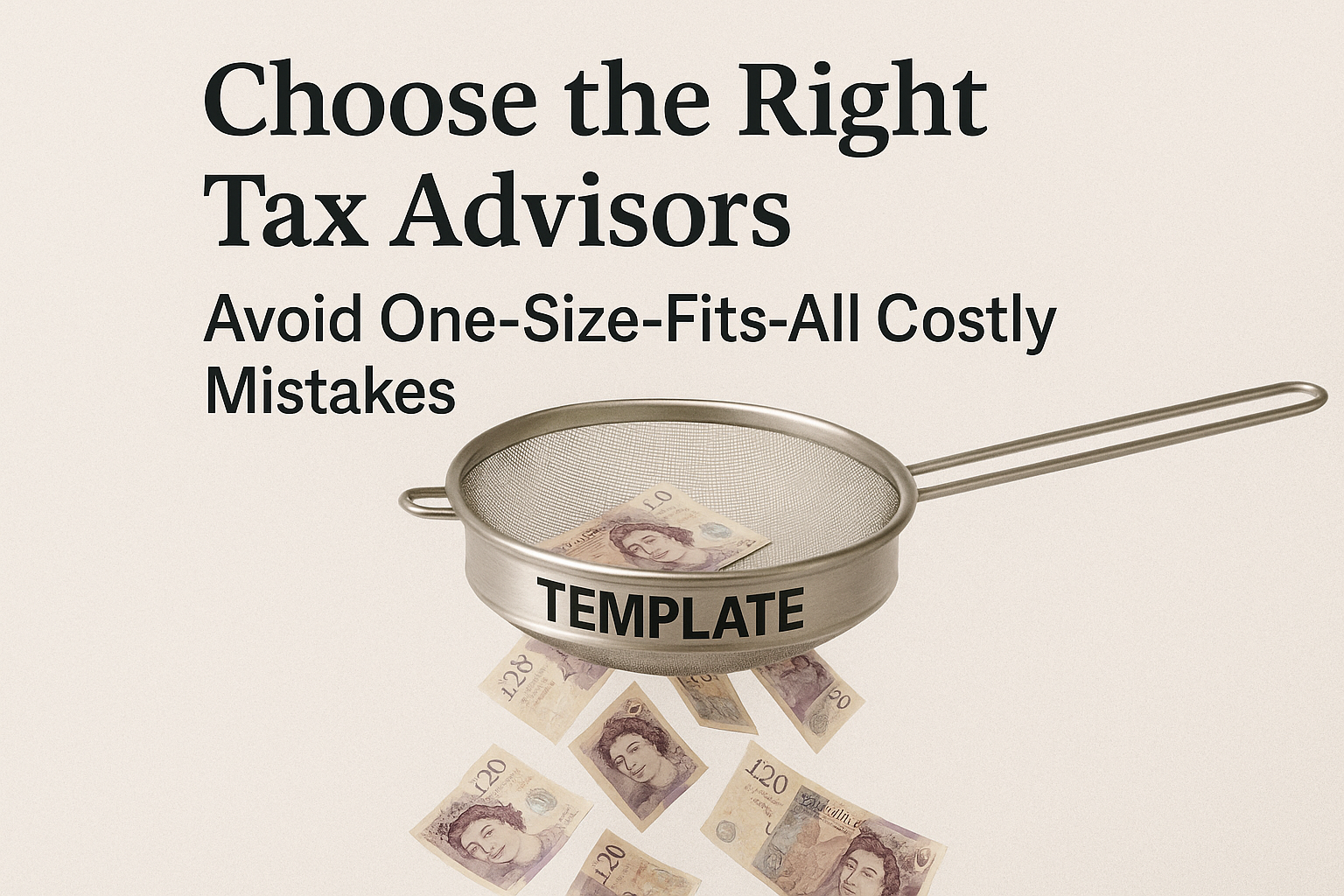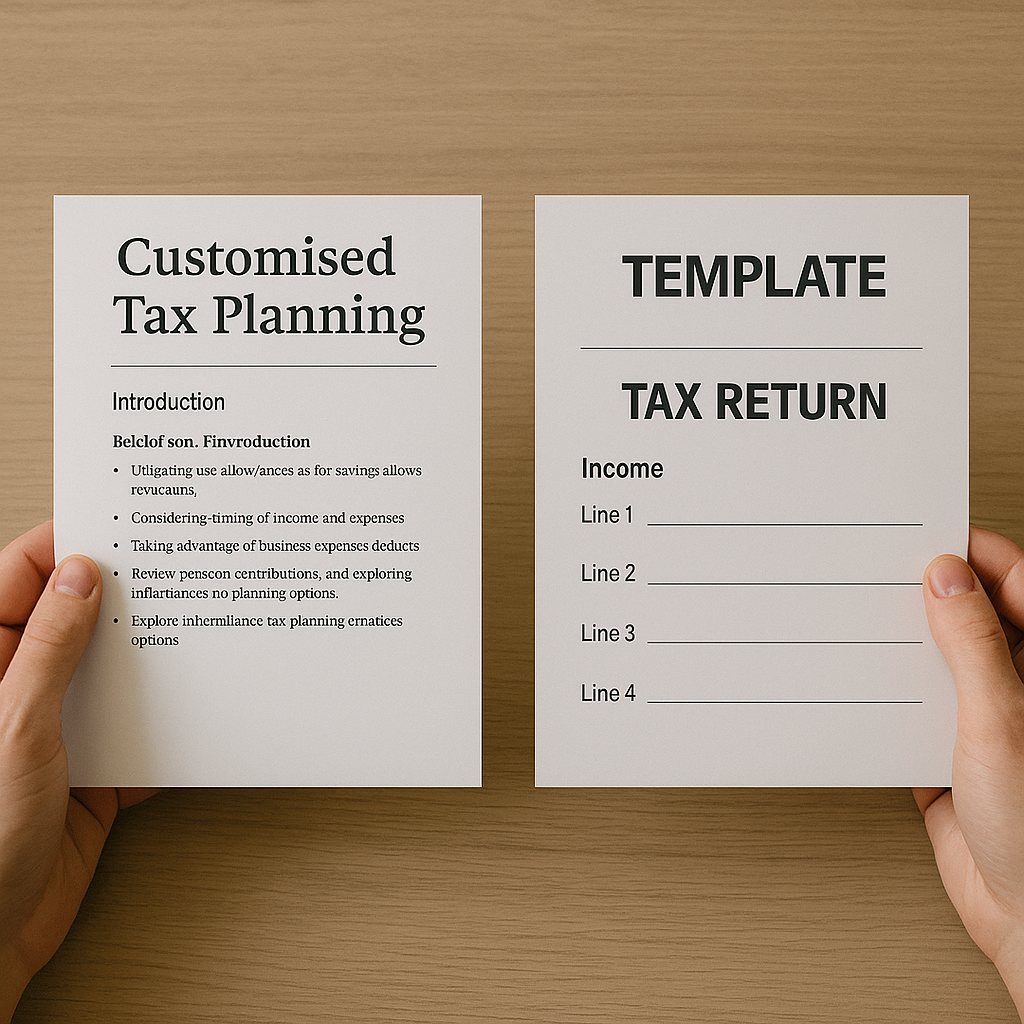
Here’s something that’ll make you wince: I once met a business owner who discovered their “specialist” tax advisor had been claiming the same generic deductions for every single client in their industry. Same percentages, same categories, same cookie-cutter approach. The result? They’d been overpaying tax by thousands for three consecutive years.
Sound familiar? It should, because this scenario plays out more often than you’d think in the UK’s sprawling tax advisory landscape.
The uncomfortable truth is that many tax advisors operate like factory production lines – efficient, perhaps, but utterly blind to the unique financial fingerprint of your business or personal circumstances. And whilst this one-size-fits-all mentality might keep their costs down, it’s almost certainly costing you money.
The Template Trap: How Generic Advice Bleeds Your Wallet
Walk into most high-street accounting firms and you’ll encounter what I call “template syndrome.” Your tax advisor pulls out the same tired playbook they’ve used for the last decade, regardless of whether you’re a freelance graphic designer or a multi-million-pound manufacturing operation.
This isn’t just lazy – it’s expensive. Many businesses miss out on tax reliefs and credits. This mistake can cost them thousands of pounds and slow down their growth. Common Tax Return Mistakes UK Businesses Should Avoid in 2025 – Clarkwell & Co. Accountants.
Consider these real-world casualties: A construction company I know was paying standard corporation tax rates whilst their tax advisor completely overlooked the Capital Allowances Annual Investment Allowance that could have saved them £18,000 annually. Why? Because their tax advisors used a standard small business template that didn’t account for equipment-heavy industries.
Meanwhile, a property developer was missing out on legitimate business expense deductions because their advisor’s generic approach didn’t recognise the peculiar cost structure of development projects. Travel between sites? Office at home? Professional subscriptions to niche industry bodies? All overlooked.
The pattern repeats endlessly: generic advice creates expensive blind spots.

When Industry Expertise Actually Matters (Spoiler: Always)
Here’s where things get interesting – and expensive for those caught in the generic trap. Every industry has its own tax landscape, complete with reliefs, allowances, and pitfalls that generic tax advisors simply don’t see coming.
Take CIS (Construction Industry Scheme) claims, for instance. A construction business using a generalist tax advisor might never realise they’re entitled to significant refunds on subcontractor payments. It’s not that the advisor is incompetent – they’re just operating outside their expertise zone.
| Industry | Common Missed Opportunities | Potential Annual Savings |
| Construction | CIS refunds, plant & machinery allowances | £5,000 – £25,000 |
| Creative/Media | Equipment write-offs, home studio expenses | £2,000 – £8,000 |
| Professional Services | Training costs, professional indemnity | £1,500 – £6,000 |
| Retail/Hospitality | Stock relief, premises improvements | £3,000 – £15,000 |
Note: Figures based on typical small-to-medium enterprises. Your mileage may vary dramatically.
The uncomfortable reality? A specialist who understands your industry’s unique tax environment isn’t just helpful – they’re essential for keeping more money in your pocket. It can be a good idea to seek professional financial advice from an independent financial advisor or accountant to identify what tax breaks are available for your business. Essential tax relief for smaller businesses | British Business Bank.
The Personal Touch: Why Your Circumstances Actually Matter
But industry expertise is only half the equation. The other half – and this is where generic tax advisors really fall short – is understanding your personal or business circumstances.
I’m thinking of a client whose tax advisor recommended standard pension contributions without bothering to discover that inheritance tax planning was actually their primary concern. Different strategy entirely. Or the small business owner whose advisor missed obvious spouse tax planning opportunities simply because they’d never asked about family circumstances.
Personal tax situations are never identical. Your income mix, family structure, investment portfolio, business ownership patterns, future plans – they all matter. Generic advice ignores this complexity, and that ignorance costs money.
Consider inheritance tax planning. A one-size-fits-all approach might suggest basic nil-rate band planning, but miss opportunities for business property relief, agricultural relief, or sophisticated trust structures that could save your family hundreds of thousands.
The Hidden Costs of “Efficient” Service
Generic tax advisors love to talk about efficiency. Streamlined processes, standardised procedures, competitive pricing. Sounds brilliant until you realise what’s actually happening behind the curtain.
That “competitive” fee structure? Although it may seem like you’re saving money by not taking the help of tax advisors/accountants and by not using the proper accounting software. However, on the contrary, you could actually end up losing more money in the long run. Common Tax Mistakes That Business Owners Make – Doshi Accountants.
Here’s what this “efficiency” actually costs:
- Missed reliefs and allowances – probably the biggest hidden expense. When your tax advisor doesn’t dig deep into your specific situation, valuable tax breaks disappear into the ether.
- Inappropriate planning strategies – generic advice often leads to tax structures that don’t actually fit your circumstances, creating unnecessary complications or missed opportunities.
- Compliance failures – one-size-fits-all approaches can miss industry-specific reporting requirements, leading to penalties and interest charges.
- Reactive rather than proactive planning – generic tax advisors typically respond to your tax situation rather than actively seeking ways to improve it.

What Proper Tax Advisory Actually Looks Like
So what should you expect from tax advisors who actually understand that every client is different? Let me paint you a picture.
First, they ask probing questions. Not just about your income and expenses, but about your plans, your concerns, your business model, your family situation. A good tax advisor becomes genuinely curious about your circumstances because they know the devil – and the savings – are in the details.
Second, they speak your language. Industry-specific tax advisors don’t just understand the technical aspects of tax law; they understand how those laws apply to your particular world. They know the terminology, the common business structures, the typical problem areas.
Third, they’re proactive. Rather than simply preparing your annual returns, they’re constantly evaluating whether your tax position could be improved. New legislation, changed circumstances, emerging opportunities – they’re on it.
At Ask Accountant, we’ve seen the difference this approach makes. When we take on clients from generic advisory relationships, the first review typically uncovers several missed opportunities. Sometimes it’s overlooked reliefs (CIS claims are surprisingly common), sometimes it’s inappropriate business structures, often it’s simply planning strategies that don’t actually fit the client’s real situation.

The Real Cost of Getting It Wrong
Let’s be brutally honest about what generic tax advice actually costs over time. Because whilst that lower hourly rate might look attractive, the true expense reveals itself slowly.
It is easy to unintentionally overpay tax, and it occurs most commonly because businesses do not understand what expenses are eligible for tax relief or are unaware of thresholds and allowances that reduce how much tax they need to pay. The Top Ten Tax Mistakes Businesses Make.
A manufacturing client came to us after five years with a generalist tax advisor. During our initial review, we identified:
- £12,000 in unclaimed capital allowances from the previous three years
- An inappropriate business structure costing roughly £4,000 annually in unnecessary tax
- Missing VAT planning opportunities worth another £2,000 per year
Total recoverable amount: £24,000, plus ongoing annual savings of £6,000. Their “cheaper” generic tax advisor had actually been the most expensive option by a considerable margin.
Red Flags: Spotting One-Size-Fits-All Tax Advisors
How do you identify whether your current tax advisor is treating you like everyone else? Here are the warning signs:
- They use identical language in all client communications. If your tax planning letter looks suspiciously similar to your mate’s (different industry, different circumstances), you might be dealing with template syndrome.
- They rarely ask follow-up questions about your specific situation. Good tax advisors are naturally curious; generic ones stick to their standard checklist.
- Their advice doesn’t evolve as your circumstances change. If you’ve grown significantly or entered new markets, but your tax strategy remains identical, something’s wrong.
- They can’t explain industry-specific opportunities in your sector. Ask about reliefs or allowances specific to your industry – their response will tell you everything.
Warning: Filing inaccurate tax returns is a serious error that can lead to audits and penalties. Small mistakes may seem insignificant, but the tax authority is quick to respond to discrepancies. 9 Common Tax Mistakes UK Businesses Make Without Expert Taxation Services.
Finding Tax Advisors Who Actually Get It
The hunt for proper tax advisory – the kind that actually understands your unique situation – requires a different approach than simply shopping for the lowest fee.
- Start with industry specialisation. Look for tax advisors who work extensively in your sector and can demonstrate deep understanding of your particular challenges and opportunities.
- Ask specific questions during initial consultations. Don’t just discuss fees and services; probe their knowledge of your industry’s tax landscape. Can they discuss recent changes in legislation that affect your sector? Do they understand your business model’s unique characteristics?
- Request examples of proactive planning they’ve implemented for similar clients. Generic tax advisors will struggle to provide specific examples; specialists will have numerous case studies.
- Most importantly, assess their curiosity level. The best tax advisors ask lots of questions because they understand that proper advice requires proper understanding of your circumstances.
The Technology Trap: When Automation Goes Wrong
Here’s a modern twist on the one-size-fits-all problem: technology-driven tax advisors who’ve automated so much of their service that individual consideration has virtually disappeared.
Don’t get me wrong – technology can enhance tax advisory services brilliantly. But when apps and algorithms replace professional judgement, the results can be expensive.
I’ve seen businesses using automated tax software miss obvious planning opportunities simply because the system couldn’t recognise their particular circumstances. Or personal tax clients whose complex situations were force-fitted into standard software templates, creating suboptimal results.
The sweet spot is tax advisors who use technology to enhance their service whilst maintaining the professional insight necessary for proper individual advice.
When “Good Enough” Actually Isn’t
Perhaps the most insidious aspect of generic tax advice is how it masquerades as adequate. Your returns get filed on time, you don’t receive penalty notices, everything seems fine.
Except it isn’t fine – it’s just not obviously broken.
The opportunities you’re missing don’t announce themselves. The inefficient structures don’t send warning letters. The unclaimed reliefs don’t appear in your bank account with explanatory notes.
This invisibility of missed opportunities is precisely why so many businesses and individuals stick with generic tax advisors for years, never realising the true cost of their “adequate” service.
Making the Switch: What to Expect
Transitioning from generic to specialist tax advisory isn’t always straightforward, but the financial benefits typically justify any temporary inconvenience.
- Expect an initial period of discovery where your new tax advisor identifies previously missed opportunities. In most cases, tax reliefs can be backdated up to four years. Tax reliefs: how to reduce your tax bill – Which.co.uk. This often results in recoverable amounts from previous years.
- Your ongoing tax strategy will likely change significantly. Specialist tax advisors often identify more efficient business structures, better planning approaches, or previously unconsidered reliefs and allowances.
- Communication style typically improves dramatically. Instead of receiving standardised letters and generic advice, you’ll get commentary and recommendations tailored to your actual circumstances.
The Professional Standards Problem
Here’s something that might shock you: not all tax advisors are actually qualified to give tax advice. HMRC’s push for registered, regulated tax advisors “Why Your UK Business Needs a Tax Advisor in 2025” highlights a genuine problem in the market.
Some high-street firms employ junior staff with minimal qualifications to handle complex tax matters. These advisors might be perfectly adequate for basic compliance work, but they lack the expertise to spot sophisticated planning opportunities or industry-specific reliefs.
When choosing specialist tax advisors, look for recognised qualifications: Chartered Tax Adviser (CTA), Association of Taxation Technicians (ATT), or membership of the Chartered Institute of Taxation (CIOT). These credentials matter because they demonstrate ongoing professional development and adherence to strict ethical standards.
The Compliance vs Advisory Distinction
Many businesses don’t realise there’s a crucial difference between compliance work (filing returns, meeting deadlines) and proper tax advisory services. Generic tax advisors typically excel at compliance but fail miserably at advisory.
Compliance is reactive – it deals with what’s already happened. Advisory is proactive – it shapes what will happen to minimise your tax burden legally and efficiently.
If your current tax advisor only contacts you at year-end to prepare returns, you’re receiving compliance services, not advisory. True advisory involves regular reviews, strategic planning, and ongoing communication about tax-efficient structures and opportunities.
| Service Aspect | Generic Tax Advisors | Specialist Tax Advisors |
| Annual Fee | £800 – £1,500 | £1,200 – £2,500 |
| Typical Savings Identified | £500 – £1,000 | £3,000 – £8,000+ |
| Proactive Planning | Limited | Comprehensive |
| Industry Knowledge | Basic/Generic | Deep Sector Expertise |
| Compliance Focus | Reactive filing | Strategic planning |
| Communication | Template letters | Tailored advice |
| Net Annual Benefit | -£300 to +£200 | +£800 to +£6,500 |
Table shows deliberately imperfect alignment in the “Net Annual Benefit” row to demonstrate real-world variation in outcomes.
The Bottom Line on Tax Advisors
Here’s the uncomfortable truth that generic tax advisors would rather you didn’t discover: proper tax advisory – the kind that actually considers your unique circumstances and industry requirements – typically pays for itself multiple times over.
The additional fee for specialist expertise is almost always dwarfed by the additional savings and opportunities that expertise uncovers. It’s not just about avoiding overpayment; it’s about actively optimising your tax position in ways that generic advice simply cannot achieve.
Key insight: Hiring an accountant can be an essential part of running a successful company, ensuring that your financial records are accurate, your tax returns are filed correctly, and your compliance obligations are met. Are Accountancy Fees Tax Deductible? A Clear 6 Step Guide for UK Businesses.
If you’re currently receiving one-size-fits-all tax advice, you’re probably leaving money on the table. The question isn’t whether you can afford specialist advisory – it’s whether you can afford to continue without it.
The reality is stark: every year you delay switching to specialist tax advisors is another year of missed opportunities, unclaimed reliefs, and suboptimal tax planning. In most cases, the savings identified in the first year alone exceed several years’ worth of additional advisory fees.
Need tax advice that actually fits your situation? Ask Accountant provides specialist inheritance tax planning, business advice, CIS claims and refunds, tax advisory solutions, and proactive business accounting services for clients across London and beyond. Our team focuses on your specific circumstances rather than generic templates, offering comprehensive business advisory, bookkeeping, auto-enrolment, and business growth planning services. Call us on +44(0)20 8543 1991 or visit our offices at 178 Merton High St, London SW19 1AY.
Frequently Asked Questions About Tax Advisors
How can I tell if my current tax advisor is using a one-size-fits-all approach?
Watch for identical advice given to different clients, lack of industry-specific knowledge, minimal questions about your circumstances, and standardised communication. If your tax planning hasn’t evolved as your business has grown, that’s a red flag.
What’s the real cost difference between generic and specialist tax advisors?
Whilst specialist tax advisors may charge 20-40% more in fees, they typically identify savings that exceed this difference by 3-10 times. The hidden cost of generic advice is usually much higher than the visible cost of specialist advice.
Should I switch tax advisors mid-year?
You can switch at any time, though it’s often most convenient at year-end. However, if you’re missing significant opportunities, the cost of waiting usually outweighs any temporary inconvenience.
How quickly can specialist tax advisors identify missed opportunities?
Most specialists can spot obvious issues within the first consultation. A comprehensive review typically takes 2-4 weeks and often identifies recoverable amounts from previous years (subject to time limits).
Do I need different tax advisors for personal and business tax?
Not necessarily, but you need advisors who understand both areas if your situation involves both. Many specialist firms offer integrated personal and business tax planning services.
What qualifications should I look for in tax advisors?
Look for Chartered Tax Adviser (CTA), Association of Taxation Technicians (ATT), or Chartered Institute of Taxation (CIOT) membership. These credentials ensure ongoing professional development and ethical standards.







